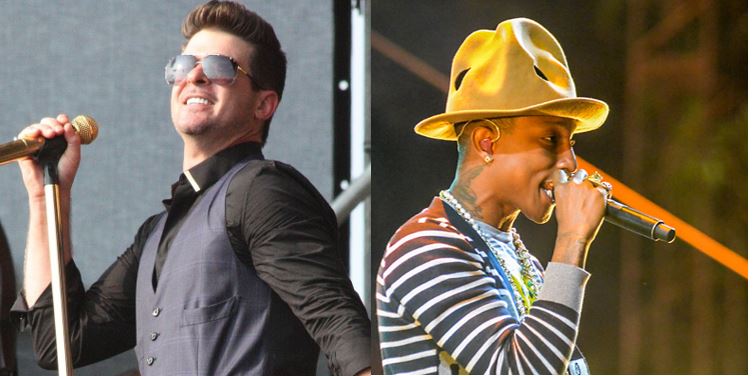
Sued for $7.4 Million: What the Pharrell Williams/Robin Thicke Lawsuit Means For Us

"The Judges have confused inspiration with appropriation and that’s why these legal ‘lines’ have become ‘blurred’."
These wise words were said by musicologist and expert witness, Peter Oxendale, who worked on the defence of the above case and is a reaction to last Wednesday's decision by the Ninth Circuit Court of Appeals to uphold a 2015 verdict that found Robin Thicke and Pharrell Williams’ hit, ‘Blurred Lines’, infringed the copyright of the late Marvin Gaye’s ‘Got To Give It Up’.
This is a landmark decision that will not only have major repercussions throughout the entire music industry, but, in particular, the music used in advertising. It’s a very bad decision. The music industry and the law are now out of sync and I’m not alone in thinking so. Indeed, one of the three judges involved, Judge Nguyen, fundamentally disagreed with her two colleagues and actually said that the songs are "not objectively similar” as they are "different in melody, harmony and rhythm,” and that this decision "strikes a devastating blow to future musicians.”
So why did the appeal fail?
I’m no lawyer but it seems [and this is a very simplistic summation] that the case failed because the other Judges decided not to look at the evidence again and to rule against Pharrell and Thicke because they failed to come up with any new significant information that could challenge the original ruling. The problem with the original ruling is that the jury didn’t really comprehend what they were being asked to judge, but instead of challenging their decision, the majority Judges have driven the case into a procedural cul-de-sac because they didn’t want to deal with the issue. I suppose it’s a good decision for lawyers - the predictable landslide of cases means there should be plenty of work on the horizon.
What the Gayes have managed to do is copyright a genre.
Yes, an entire genre of music. The more you read it, the more insane it seems. What this means is that the first person to pen a disco track owns all disco music. The most well-known chord structure in the world - the 12-bar blues - could in theory have been copyrighted by say Louis Armstrong which could mean that the millions of ensuing Blues recordings will all have copyright issues. By this logic, almost all of the music we listen to on a daily basis could be open to being sued and, moving forward future artists need to be very careful about who they admit to listening to. Lets be honest, there would be no Oasis without Lennon and McCartney. No Beethoven without Mozart…….without the past there is no future.
What does this mean for advertising? Advertising is derivative. We tend to use imagery that is familiar. Ditto with music. 90% of music that is composed for advertising has been ‘influenced’ by other bits of music. Indeed, when composers turn up for an ad brief, they are invariably (almost always) played an existing - usually famous - piece of music that the creatives/editor/director have collectively fallen for. So, if the subsequent composed piece has any similarities with any well known track, they may well be open to being sued. Especially if the track has been written by a composer that is not savvy with the whole notion of infringement and can be, unwittingly, provocative.
So what do we do to keep the legal stormtroopers from kicking down our doors?
In light of this new ruling music needs to be discussed right from the very beginning of an advert's inception and not left to the last minute where rash decisions are often made. It can’t be given over to well intentioned editors and creatives to plunder their playlists. Now more than ever before music needs to be treated forensically. It’s essential to acknowledge that we don’t have to like the piece. It doesn’t need to sound like an artist we admire but more about who we’re aiming this ad at. What people buy this product and what kinds of things do they listen to? What are their tribal allegiances? Their emotional triggers? Also spare a thought for music library companies? The majority of their music [hundreds of thousands of tracks] were written for the sole of purpose of providing broadcasters with something that sounds like the track they can’t afford.
Sadly, it seems to me that the most important thing now is to work with composers and music companies that have indemnity insurance because even those artists with the best and most honourable intentions now have no idea from what direction the lawsuit is coming.
Irony.
The Gayes, no doubt, are pleased by this outcome. They’ve won a big legal battle and are significantly wealthier, but they too need to be careful. As Judge Nguyen concluded, "They own copyrights in many musical works, each of which (including 'Got to Give It Up') now potentially infringes the copyright of any famous song that preceded it…” They better hold onto some of that cash.













